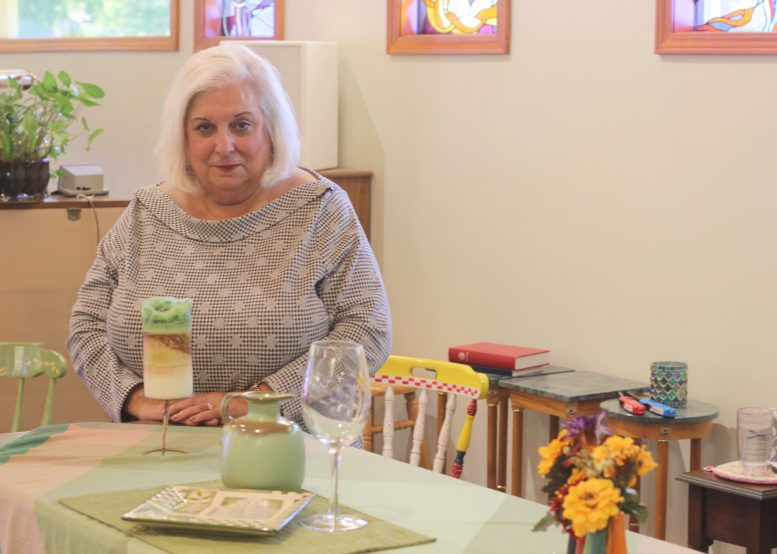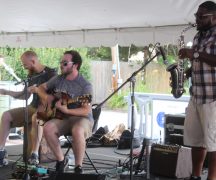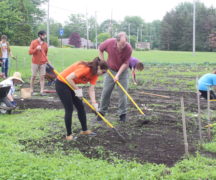By DAVID DUPONT
BG Independent News
Pastor Deborah Conklin received her call in the parking lot of Peace Church.
And she wasn’t happy about it.
Conklin had just pulled in for an interview to become the new pastor of the Bowling Green church, and she felt the pull of a religious calling. Being a full-time pastor wasn’t part of her plans. She wanted to work as an interim or part-time ministry so she could continue her work with the homeless in Toledo. But “the synod puts all this money into training you up,” she said, and she’d already turned down one position, so there was pressure.
“Dammit I felt called,” she said with characteristic bluntness. “In the driveway I felt this incredible call that this is where I need to be.”
Conklin knew her only hope was to go into the interview at Peace and give the most honest interview she could “so they wouldn’t call me.”
She told the committee the unvarnished truth about herself. If they hired her she would change the place. “I was a visionary, manic, risk taker.”
She was progressive. She cussed. Her husband was not going to be involved, so they weren’t getting a two-for-one.
They hired her.
She asked for a second interview with more parishioners involved.
The offer stood.
So 20 years ago Conklin became the pastor of Peace Lutheran. On Sunday, Oct. 13, during and after the 10:30 a.m. service they will recognize that milestone.
Conklin, 69, said she agreed to the celebration only if “we’re going to affirm this partnership.”
“This joint adventure has been painful. It’s been joyful. All the things that happen when you’re in authentic relationships.”
Conklin felt the pain at the very beginning of her time at Peace. She was “broken hearted” the first year. When she would travel to visit someone at St. Vincent’s Hospital, she would take a roundabout route to avoid going by the office of FOCUS, the social service agency she’d saved from closing.
Her journey to the ministry had been equally circuitous.
She’s a native of north end of Toledo near the old Buckeye Brewery. “It was a very eclectic, a very cosmopolitan community,” she said. “We were poor but we didn’t know it. We were working poor of every ilk. The Friendly Center was a wonderful place where we would gather and learn to love one another.”
Her grandparents came from Damascus, Syria. She was raised a Roman Catholic, though with her mother she attended feast day celebrations in St. George’s Syrian Orthodox Church.
Then in 1973 she married a divorced Methodist with three daughters. She expected she would be married in the Catholic Church, but wasn’t allowed. She could have been a lapsed Catholic, but took the more extreme step of being excommunicated.
The day she received her papers was “probably my first big heart break.” She still refers to herself as a “recovering Roman Catholic.”
The family lived south of Whitehouse in the house his grandparents had lived in. She once described herself as “an earth mother.” She grew the family’s food, meat and vegetables, grown organically.
Her husband hauled grain and fertilizer and when he needed another driver, he trained his wife.
Conklin drove a rig for six years.
The family attended the Methodist Church until, through a friend, she went to a Lutheran service and realized “this is like the Roman church ‘all growed up.’”
What she didn’t realize at the time was that this church was “on the edge” and not typical.
In 1987, she started doing social justice work with the Toledo Metropolitan Mission, and when she got comfortable there, a friend suggested she apply for the director’s job at FOCUS.
“My own particular history is I venture into big projects by risk not by talent.”
The agency was on the brink of failure. Her friend told her she had nothing to lose. If it closed no one would blamed her and if she succeeded “she’d be a star.”
She succeeded. When Conklin arrived, the agency had a position and a half. She was the half-time employee. Its budget was about $50,000. With help of state and federal grants and assistance from Catholic Charities, she built it to a staff of 19.5 — she was still half-time — with a $1.5 million budget. FOCUS helped homeless people find places of their own, and then provided services to them to help them stay settled.
As Conklin was doing this, she was also working toward a bachelor’s degree in religious studies at Lourdes College, and then afterward studies at Trinity Seminary.
First she served as interim pastor at her home church in Whitehouse. Serving an interim or part-time suited her aims because it allowed her to stay with FOCUS.
“I was not on a career track. I didn’t have to be, to be responsive to the gospel. Social justice did that,” she said.
That attitude freed her up in her work at Peace. She was a change agent. Her mantra is: “Everything is up for grabs but Jesus.”
The service changed. Rainbow Daycare was given notice.
Many parishioners, about three-quarters of them, left, though other new members have joined.
That’s inevitable when a church is never satisfied with being comfortable.
She founded a vision committee, and they wanted to add a second service with more music.
“I liked the idea about being multi-sensory,” she said. But she told them: “Let’s get this clear. If we introduce a second type of service, it’s not going to be Jesus-lite.”
She didn’t want it to be a “seeker service” for new churchgoers with the expectation that they would eventually graduate to the “real” service.
“It has to be an authentic, full blown worship experience which means we gather, we ingest the word, we share the supper, and we are sent out as ambassadors of Christ.”
Peace offers three distinct services. On Thursday evenings there’s the Taizé service, a contemplative, candle-lit, prayer service.
On Sunday at 9 a.m. there’s a communion service where “we just chat about what the scripture is for the day.”
The 10:30 service has a sermon, communion and full band. There are no restrictions — the church has removed the doors to sanctuary. People bring food and drink in. Children play. No one shows people their places nor passes around a collection plate.
All three services share the same scripture.
That was, she said, “hard on the traditionalists.”
“This can feel structureless to some people, not enough definition for some folks,” Conklin said. “Some folks want more programming for children. I appreciate all that. There’s a lot of other places in this town where this happens. … We’re not a smaller version of St. Mark’s.”
If someone wants a larger church with lots of programs, St. Mark’s will welcome them. And there are other more traditional small Lutheran congregations nearby.
“Our reason for being is to connect the disconnected,” Conklin said.
Some feel disenfranchised. They are “those who the church has said you have to fix something to be fully included.”
They may be divorced, or gay, or have children in prison. “Whatever — you don’t live up to whatever standard the church has.”
Then there are those people “who feel a commitment to faith, but just are disillusioned with it all. It doesn’t feed their spirits. It doesn’t provide a reason for their every day existence.”
Others have no connection to faith. They don’t know the holy stories or the prayers, never mind the theology. They would typically be welcomed in church but must study before being fully accepted.
Peace takes them in and seeks “to bring Christ alive in their daily lives,” she said.
“Our only reason for being is worship. Everything grows out of the worship experience. So worship has to be equally accessible to all people,” Conklin said.
“When you are here, when we are gathered, that’s who the people of God are.” That’s true when it’s a worship service or anything affiliated with Peace Church. “Whenever Peace is attached to some kind of gathering, whether it’s here or somewhere else, it must be a place that Christ would feel welcomed.”
The next challenge facing the church will be finding a new pastor within the next five years. Conklin said she would hope to stay until she’s 75, but that depends on her family responsibilities.
Finding someone like herself “seasoned by other experiences” would be best.
This gave her a certain freedom. “I didn’t have to worry about losing my job, or ticking off the biggest donor.”
A church works best when the pastor and congregation work in parallel without one wielding power over the other.
She doesn’t strive to be everybody’s best friend. “I do see myself as the resident theologian,” she said. “My role is to bring Christ alive to them, to bring Christ alive in their daily lives.”
A friend asked why she accepted the call to become pastor. She responded : “Because I believe my own b.s. I mean, I actually do. I’m not perfect by any means. I’m a praying person.”
When she prayed on the decision “God kept saying and, and, and. And I said ‘ef’ it. I’ll go. Not that I wanted to. I’m very pleased and grateful for Peace Church. We are what we are.”




